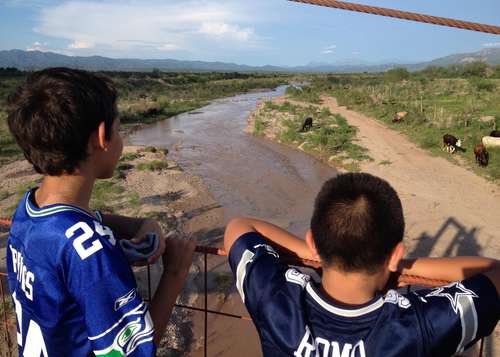▲ Only administrative sanctions were imposed for the spill of toxic waste from the Buenavista del Cobre mine into the Sonora River.Photo by Cristina Gomez
Jared Laureles
The newspaper La Jornada
Thursday, August 22, 2024, p. 15
In the last 24 years, Grupo México has operated in the country a corporate capture of the state
to follow in total impunity
and multiply his fortune by more than 900 percent, going from 7 billion to 28 billion dollars in that time, leaving behind destruction, pollution, illness and death
accused the Sonora River Basin Committees and academics.
Sponsorship of political campaigns, the hiring of former officials through the revolving door and legal proceedings that the company’s lawyers are pursuing that end only in administrative sanctions, are some of the actions that the Germán Larrea consortium is carrying out to avoid comprehensively repairing the damage to the affected communities and workers, said Martha Patricia Velarde, a member of the committees.
In the case of the Sonora River, the spill of 40 million liters of hazardous waste from Grupo México’s Buenavista del Cobre mining company is causing havoc to the region’s economy and serious effects on human health, which have only resulted in sanctions, he said.
In the Transnational Corporate Impunity discussion, convened by the civil association Poder, which legally accompanies people who suffer damage to their health, the affected resident of the municipality of Baviácora pointed out that the mining consortium also uses the lobby legislative to influence the way laws are drafted and thus leaving legal loopholes that (the company) uses to its advantage
in addition to creating self-regulations to fail to fulfill their responsibilities.
An example of this, he explained, was the criminal complaint filed by the Federal Attorney for Environmental Protection against the consortium; however, in collusion
with the government of Enrique Peña Nieto They decided to take this process to an administrative area to reach an agreement.
such as the Sonora River Trust, whose resources of 2 billion pesos have been insufficient to repair the damage to the eight communities.
Like that case of environmental destruction, Grupo México also dumped toxics into the Bolaños River in Jalisco in 2010; the Santa Cruz River in Nogales, Sonora, in 2014, and five years later in Sombrerete, Zacatecas, and the Sea of Cortez, noted Raúl Ornelas, from the Economic Research Institute of UNAM.
The researcher considered the multinational not as a socially responsible company, but a criminal company
whose economic power lies not only in mining, but in an industrial empire that has diversified into railroads, infrastructure and entertainment.
The effects on Grupo México companies also extend to the people they employ, as in the case of the strikes in Cananea, Sombrerete and Taxco, which broke out in 2007 due to the lack of security, as well as the industrial murder
of 63 miners in Pasta de Conchos, Coahuila, in 2006.
Cristina Auerbach, director of the Pasta de Conchos Family organization, said that 588 miner deaths have been documented in the coal mines owned by Grupo México and that the company has not been sanctioned in any case, she said.

















